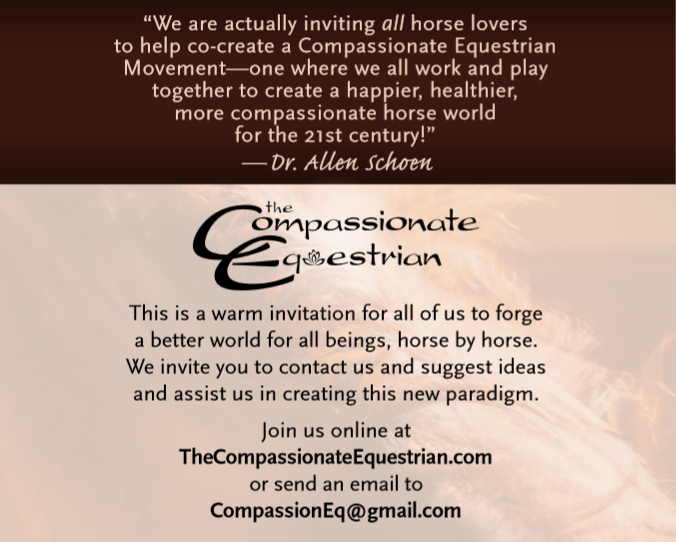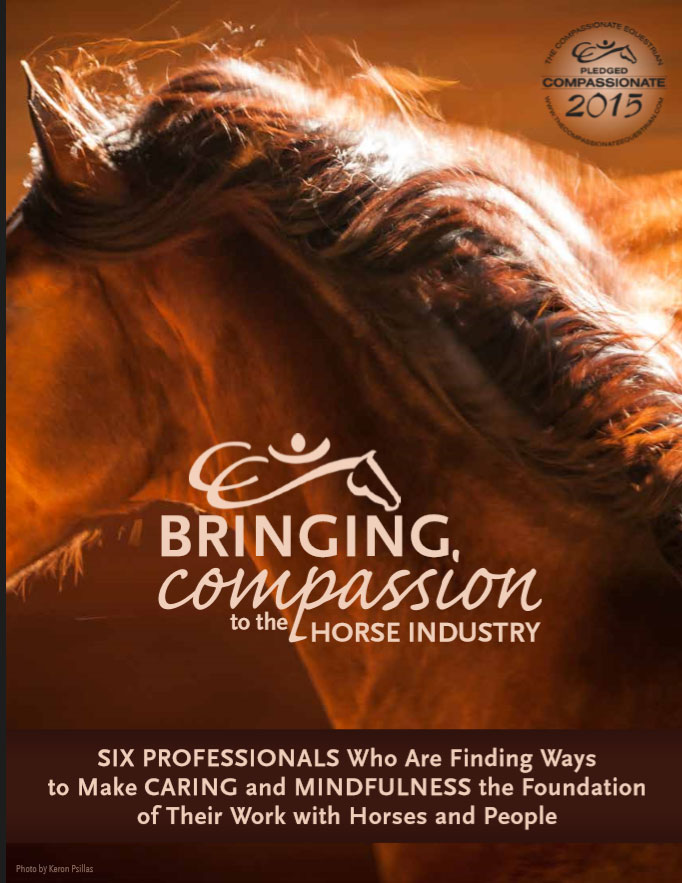
Six Professionals Who Are Finding Ways to Make Caring and Mindfulness the Foundation of Their Work with Horses and People
by Rebecca M. Didier
As happens, this story begins with a chance meeting…it was on a beautiful, hard-to-reach island off the coast of British Columbia that two individuals from different parts of the horse world discovered they not only shared an idyllic view, they also had a common goal: to fundamentally change the way the equine industry works, how it affects the lives of those within it, and how they, in turn, influence the world as a whole.
Susan Gordon is a horse trainer who left her equestrian career when she grew disillusioned with the scene and disheartened by the trend of “broken” horses she watched constantly rotate through her barn. Dr. Allen Schoen is a renowned pioneer of integrative veterinary medicine and author of several popular books on the power of the animal-human bond. When Gordon discovered that Dr. Schoen happened to be one of the 12,000 inhabitants on her island home, she reached out, and it wasn’t long before the two found they shared similar concerns about the state of the horse industry.
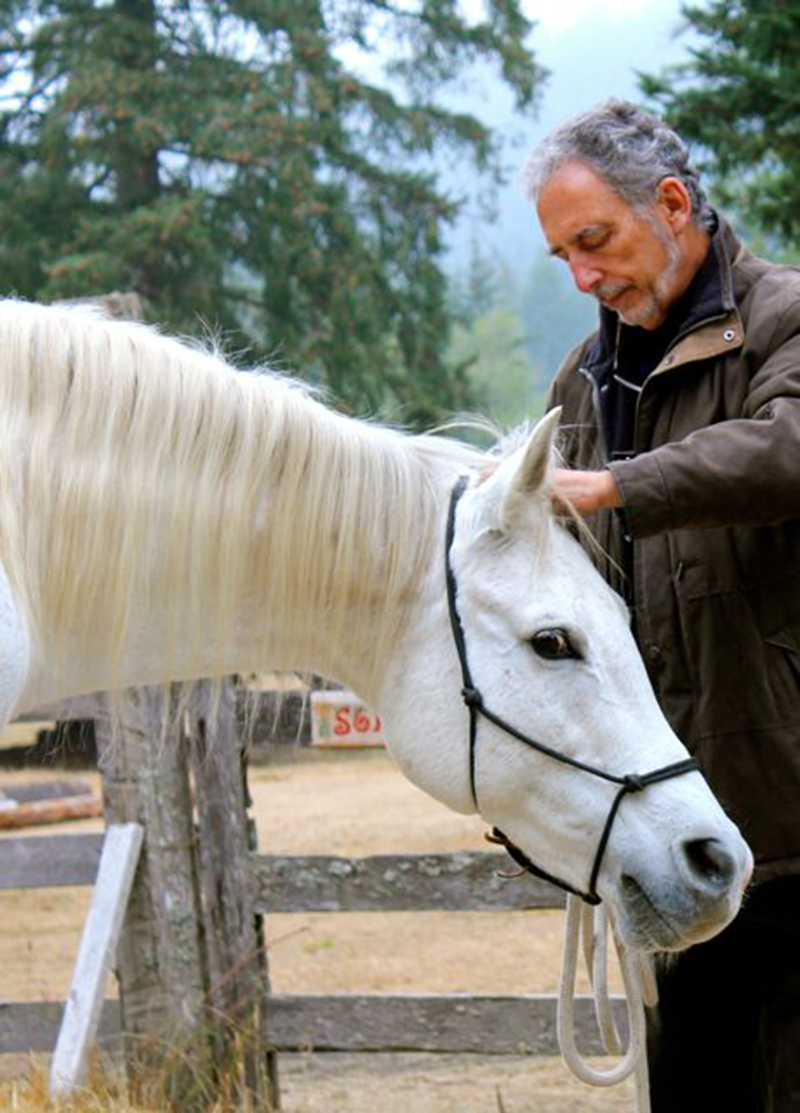
And that was all it took: A new social movement—one with horses and horse people at its epicenter—was born.
“At a conference, I was asked how I integrated creativity and compassion into my veterinary practice,” remembers Dr. Schoen, “and I shared that actually, that summed up my career: having compassion and wanting to help animals that could not be helped any other way. As I reviewed the scientific research on the benefits of compassion, I felt that perhaps it was time to develop a compassionate care program as a foundation for every way we interact with horses. I became aware of Dr. Karen Armstrong’s Charter for Compassion [ed. Note: Armstrong, a prominent religious historian, won the TED prize for proposing the charter in 2008] and decided to somehow contribute to the charter from an animal health care perspective.
“Susan Gordon introduced herself to me during that time as someone who had similar interests from a horse trainer’s point of view…We decided to collaborate on a book (The Compassionate Equestrian), which we see as the beginning of a global horse community focused on creating Compassionate Equestrians.”
Dr. Schoen and Gordon conceived 25 Principles that they felt provided manageable, reasonable steps for caring for and working with horses in a more conscientious, compassionate way. By developing deeper compassion for horses and for other horse people, equestrians can begin to transcend differences and disagreements (regarding breeds, disciplines, training techniques, tack and equipment—you name it), learning instead to empathize and connect more closely with the “global collective” of likeminded individuals. These 25 Principles, outlined in their book, have been applauded as essential for positive change by leading names in the equine industry, including Hilary Clayton, Mary Ann Simonds, Linda Tellington-Jones, and Philip Richter.
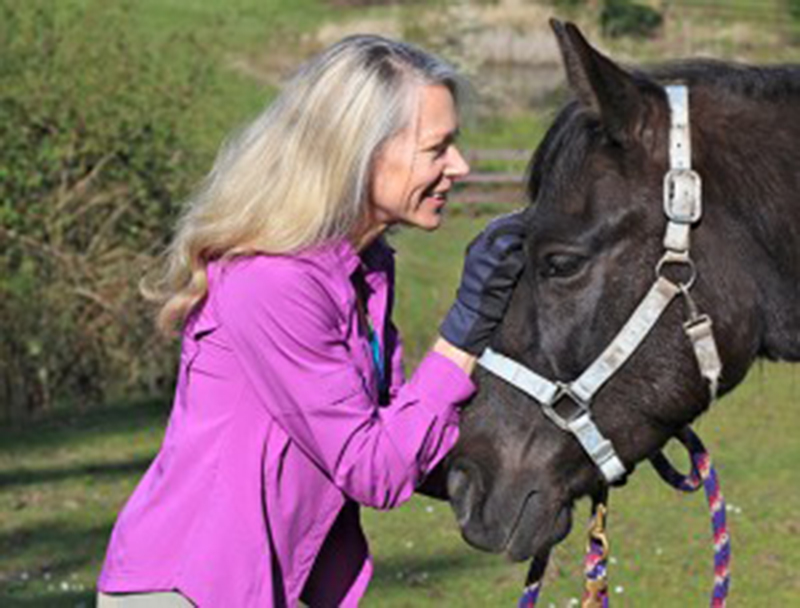
“The Principles are a deep, personal set of commitments that may enhance your experience as a horse person and as a person in general,” says Gordon. “In the process of writing them with Dr. Schoen, I found I had to let go of the last remnants of my old trainer’s mindset…I now see that in many ways over the years, I likely provoked some of the very circumstances I would love to see change between other horse people and in how they interact. The practice of compassion is not an easy path, but it is one that creates an extraordinary lightness, joy, and palpable difference in the areas of our lives that most need improvement.”
Dr. Schoen and Gordon believe that the Compassionate Equestrian Movement can help people better their relationships with their horses, enjoy more fulfilling experiences in the saddle, and create barn and showground atmospheres that are positive and life-affirming, for both horses and humans. They have put out a call for others to join them in their effort to co-create a horse industry that is ultimately for the good of all involved, and now others—from all over—are finding their own unique ways to add their voices to this effort. Here are a few of their stories.
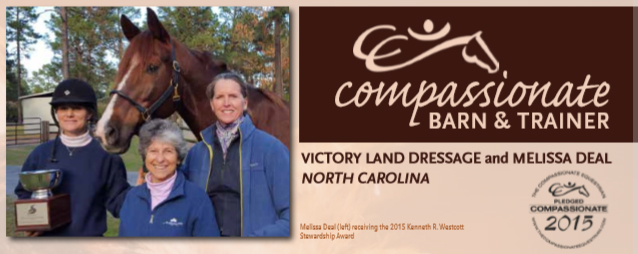
Compassionate Barn | Compassionate Trainer:
Victory Land Dressage and Melissa Deal, North Carolina
Victory Land Dressage is a farm that strives to redefine what it means to “win” when it comes to riding and training horses. On the fringes of the picturesque town of Burgaw, just west of Wilmington, owner and resident trainer Melissa Deal offers lessons and clinics that focus on enhancing the horse's way of going, his mental and emotional comfort, and overall enjoyment of both horse and rider.
“It is my sincere desire to provide a place of refuge,” says Deal. “I am passionate about the relationships I form with each horse and rider that I encounter. I consider it a privileged opportunity to help riders and horses find greater joy in their lives together. And I know the importance of happy, sound horses, safe interactions, and kind, yet effective training for horse and rider in this endeavor.”
Melissa Deal has done it all within the industry—from riding with classical masters and grooming for Olympians, to teaching and coaching collegiate riding teams. She has been American Riding Instructors Association (ARIA) certified in dressage, stock seat, and hunt seat since 1999, and is a founding board member of the United States Refined Horsemanship Association (USRHA), an organization that awarded her the 2015 Kenneth R. Westcott Stewardship Award in January 2016.
“According to my mom, my first word was ‘Daddy’ and my second was ‘horse,’” says Deal with a smile. “Not sure if it’s true but regardless, these two things remained great loves throughout my entire life.
“My first horse came to be after I hiked over a mile one way for several months to take care of a foundered pony. The farm owners offered to let me keep a horse at their place for no charge in return for my dedication. I withdrew my life savings (practically every dime I had made in my nine-year-old life, including allowance and gifts) and my first horse was purchased! Cleaning stalls for two dollars an hour helped support my new horse’s care.”
After a childhood of riding and showing locally on weekends with the support of her devoted father, Deal enrolled in an Animal Science program at North Carolina State University. She was the first intern ever in the NCSU Equine Program, beginning an internship system there that still exists today, and took every horse job she could find through undergraduate and grad school.
“I have been blessed with the opportunity to experience many disciplines,” says Deal. “From halter horses to jumping and dressage…all contributed to my education. I am committed to learn from every encounter with each horse that I touch. Many highly skilled and knowledgeable people have influenced my journey, and for that, I am eternally grateful.”
Deal states that she is willing to embrace everything she can find to “help the horse” and cultivate compassionate methods of communication between horses and riders, but her current areas of focus are dressage, obstacles, and reward-based training. In addition, the horses at Victory Land Dressage are kept as naturally as possible.
“Dressage is my personal passion,” she says. “It is the method via which I pursue a great degree of harmony and high level of communication with the horse. Dressage also challenges me mentally and physically to be congruent in what I desire and what I actually communicate to the horse. When done well, it is a discipline that requires the fundamentals of the horse’s development to be paramount.
“A great horse, Eclipse, and an equally wonderful lady, Shawna Karrasch, convinced me to use positive reinforcement in way that is meaningful to horses and it has been life-changing for me,” Deal goes on. “Reward-based training is something I believe in very strongly. It builds trust and confidence and adds joy to a horse’s work and the tasks that we ask of him. I believe that it is a key element in all under-saddle and in-hand interactions, including daily requirements of being a horse in a human’s world. I often just use a word as a bridge signal, rather than a clicker and food to support the horse and confirm desired behaviors. This makes the technique practical for all situations and enables me to bring trust and comfort to horses in times when they need it most.
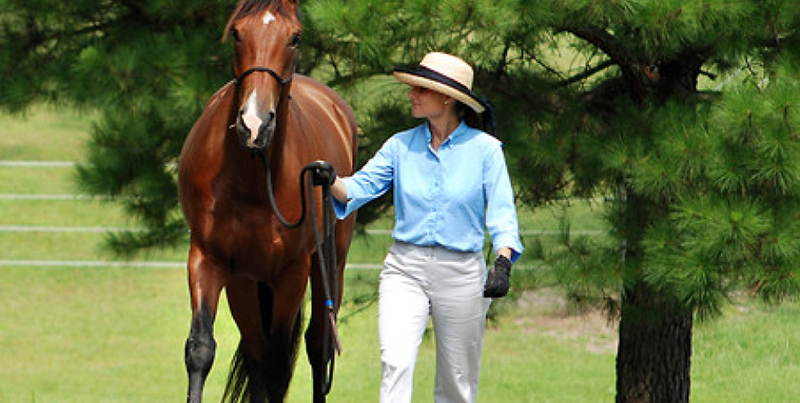
“Obstacles in combination with this type of reward system allow me to work with riders to create horses that are well-adjusted, safe citizens in a variety of circumstances. It is our role as stewards of the horse to help him become as comfortable as possible in all situations. In this way, we are best assured that he will be easy to handle and experience as little stress as possible. I believe this ability to be ‘calm and safe’ is probably the single most important characteristic that determines if a horse will be well taken care of and sustain a good quality of life.
“In all training experiences, I try to keep the horses’ stress as low as possible. Recognizing and addressing physical pain and emotional angst are top priorities. I go to great lengths to make sure that their comfort is continually sought. Rewards and confirmation are lavish and positive reinforcement is used as much as possible. Victory Land Dressage horses live more naturally now than they have in the past, and I will continue to morph their environment toward what is most beneficial as more information is available through research and observation.”
Deal says that Dr. Allen Schoen and Susan Gordon’s book The Compassionate Equestrian changed her life “permanently and dramatically.”
“I spent months reading, rereading, and studying the book in depth,” she admits. “It affected me in ways that I could have never imagined and caused me to find myself rethinking not only what I did with horses but with humans, too, on many levels. I began to realize how limited my perspective had been despite years of world-class training and education in the equine field.”
Deal was moved to contact Dr. Schoen and Gordon and ask them how she could help the Compassionate Equestrian Movement.
“I jumped at the chance to share their mission,” says Deal.
With support and encouragement from Dr. Schoen and Ms. Gordon, Deal reached out to like-minded individuals in her community, holding one of the first ever Compassionate Equestrian gatherings at Victory Land Dressage—an opportunity to discuss the 25 Principles of Compassionate Equitation and how they can be observed in barns of any size, with any disciplinary focus, if only the common greater good is considered in all actions and interactions. The success of her first meeting encouraged her to continue her efforts, and since then she’s held three more, at her own farm and others.
“The response has been fantastic! Greater than I had even hoped,” Deal reports with glee. “The spirit of the attendees, whose hearts were clearly for the horse, was one of unbelievable strength and empathy. It is my hope that through my farm, my teaching, and my commitment to compassion within the horse industry, I’ll help inspire others to make every attempt to understand what the horses in their lives might be thinking and feeling, emotionally and physically, in any and all circumstances. In this way, the quality of the horses’ lives and the relationships between horses and humans will be enhanced as the understanding between them gains clarity and harmony.”
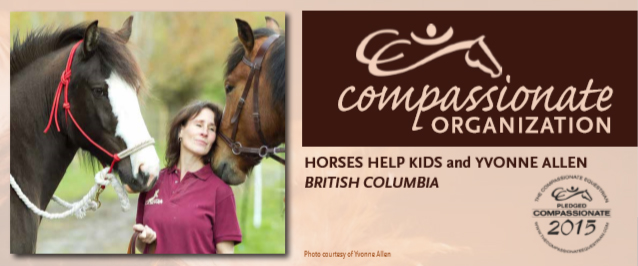
Compassionate Organization:
Horses Help Kids & Leading the Change Music Project | Yvonne Allen, British Columbia
Yvonne Allen is an equine bodywork practitioner who works with a number of different therapeutic modalities in her business At Ease Horse Care. She was greatly inspired by the work of Marijke van de Water, BSc, DHMS—an equine health and nutrition specialist and homeopathic practitioner in British Columbia who found Riva’s Remedies, provider of specialized, personalized, natural health care for animals and humans. Allen studied under Dr. Brian McLaren, BVSc, MAppSc, Founder of Advanced Photonic Therapy and Geary Whiting from Geary Whiting’s Equine Massage School, as well as attending the Northwest School of Animal Massage in Fall City, Washington. Her interest has led her to incorporate Bach Flowers, aromatherapy, and Reiki in her work, and in addition, she has become a Certified Virtues Project™ Facilitator.
Allen’s Horses Help Kids and Leading the Change Music Project showcase the artistic and creative talents of youth through equine-inspired music productions, aiming to promote personal and social development skillsets for children from all walks of life, enhancing and empowering their lives with the horse as muse and motivator.
“I was inspired to bring Horses Help Kids to life through an organization I founded in 2007 called Voice for the Horse,” explains Allen. “ Voice for the Horse advocated for the humane care, treatment, and management of horses via, first, an equine-inspired international children’s writing competition (now evolving into a song-writing competition for amateur writers). Horses Help Kids sprang from this—a new business built on the principles of philanthropy that aims to help kids strengthen their lives through lessons learned from the horse.”
Through annual song-writing competitions, Allen aspires to feature young up-and-coming songwriters who will continue to “lead the change” through their creative talent. Winning song submissions are professionally produced and placed in a curated library of music, and the youth songwriters have the opportunity to become ambassadors for Horses Help Kids, helping build a global network dedicated to creating a stronger and kinder world for all.
“My aim for Horses Help Kids and Leading the Change Music Project is to showcase all the ways horses help people today,” Allen emphasizes. “Our main focus is to encourage social and personal development in children. We believe if we can inspire creativity in the lives of our children and offer them a platform where they have the opportunity to work in unity, they will grow up stronger within themselves, and in the world around them. It has become evident today we do not have the access and connection to horses we once had—through Horses Help Kids and Leading the Change Music Project we are able to reclaim this connection, bringing horse back into our lives in the most fundamental ways.”
Yvonne Allen was introduced to Compassionate Equestrian Movement co-founder Susan Gordon back in 2013, and it quickly became apparent they shared the same vision—advocating for a kinder world for both horses and children. Allen became a proponent for the 25 Principles and the Movement that Gordon and Dr. Allen Schoen so hope will change the equestrian world for the better.
“To have the world recognize the horse as a sentient being will bring greater respect for horses in general,” says Allen, acknowledging the first of the 25 Principles of Compassionate Equitation. “But I also believe we have only just begun to comprehend the horse’s potential for greater service for humankind, and that today more than ever, we need to have them in our lives. I feel we are on the cusp of a very beautiful shift in paradigm, with the horse leading our way.”
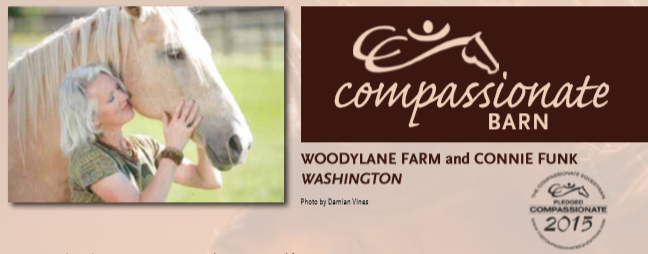
Compassionate Barn:
Woodylane Farm | Connie Funk, Washington
When she was given a smart, troubled horse at midlife, Connie Funk began a journey of self-discovery—as she worked to heal the young mare, Chasta, she found herself confronting her own life questions and ultimately growing immensely on a personal level.
“Woodylane Farm is my home, which has given me the greatest blessing of being able to have horses to share with others,” says Funk. “We host workshops featuring equine-assisted healing and learning practitioners, positive-reinforcement training, and holistic healthcare, as well as field trips for children, art therapy, and Psych-K Belief Change facilitation. Located in the northwest corner of Washington state, natural beauty and abundant wildlife provide a stunning backdrop that supports education in being compassionate stewards of all life.”
At first seeking help in the Natural Horsemanship movement, Funk consulted books and films and attended workshops about the horse/human bond. She cites Eponaquest® Worldwide founder Linda Kohanov, Chiron’s Way creator Sandra Wallin, and Barbara Rector’s Adventures in Awareness™ as key to her developing a better understanding of what she was experiencing with Chasta and other horses.
“Equine artist Kim McElroy allowed me to feel more deeply my emotional connection with horses,” Funk adds. “And liberty as a form of interaction with horses became a huge opening for me to find the ability to problem-solve through play. Liz Mitten Ryan, Carolyn Resnick, Jonathan Field, Debra Olson Daniels, Stormy May, Frédéric Pignon, Linda Tellington-Jones, Elsa Sinclair, and others have been incredibly inspiring mentors."
Funk found herself most drawn to the use of play at liberty as positive reinforcement, and so bases much of her work with horses and as an equine-guided educator upon this premise. And additionally, she strives to have all her personal interactions with horses, as well as the educational offerings on her farm, dovetail with the theme of growth through compassionate understanding and awareness.
“In my pursuit of education about the horse-human bond, I discovered Dr. Allen Schoen's books and traveled to Victoria, British Columbia, to attend a holistic healing workshop where he was a keynote speaker and teacher,” explains Funk. “I was and remain in awe of the incredible body of knowledge that he so freely shares. He is a contemporary Saint Francis to me, a mentor, and truly inspirational. We have corresponded across the miles throughout the process of the creation of The Compassionate Equestrian Movement, and it is now an honor and opportunity to become a part of this hugely important message that extends far beyond equestrian pursuits—compassionate awareness as a way of life is a life-sustaining and saving practice.
“At a recent Woodylane Farm workshop I shared the book The Compassionate Equestrian with the participants, and we individually and collectively pledged to incorporate the 25 Principles outlined by Dr. Schoen and Susan Gordon into our work—and play—with horses, and all life.
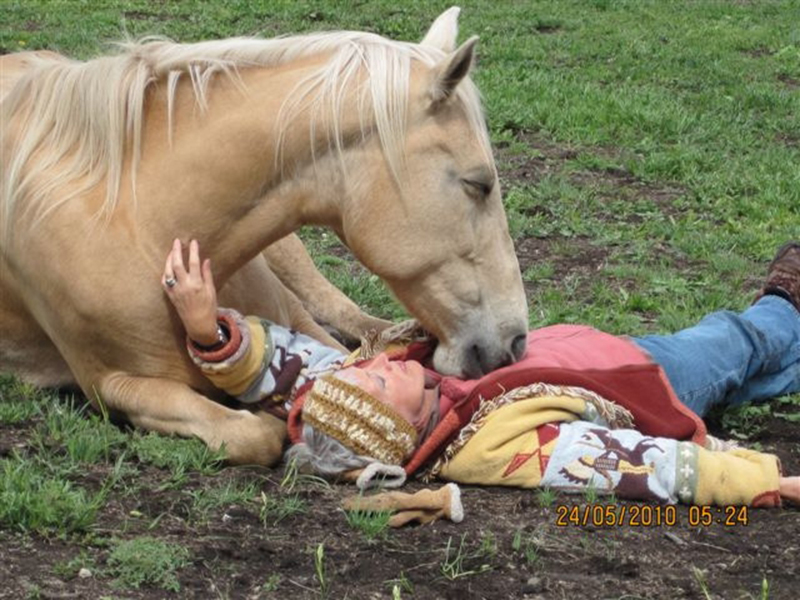
“My hope for becoming part of The Compassionate Equestrian Movement can really be summed up best by the time-honored words, ‘Let there be peace on earth, and let it begin with me.’"
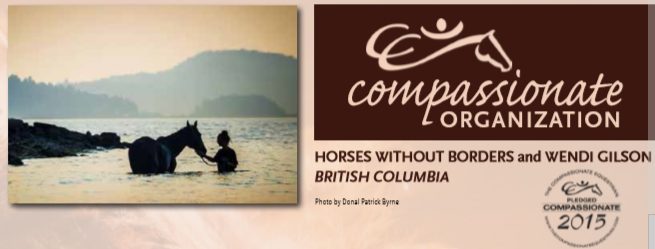
Compassionate Organization:
Horses Without Borders | Wendi Gilson, British Columbia
Wendi Gilson had horses in her life from an early age. Her career included all manner of equestrian pursuits, from the North American Thoroughbred racing industry, to an overland trip by horse and wagon to California and back with The Caravan Stage Company, to farrier school and studies in barefoot philosophy and theory. By turns a teacher, writer, photographer, and ever-curious student of the horse, she has now focused her energies on rehabilitating injured horses and growing the organization she founded—Horses Without Borders—which aims to help all horses, locally and globally.
“Horses Without Borders (HWB) was created as a rescue organization and a place of discourse,” explains Gilson. “Our goal is to help anybody connect with horses, using body language and other methods of nonverbal communication. In addition, we discuss and address global issues affecting horses and their humans—in particular, how important horses are to developing countries. We believe the 25 Principles of the Compassionate Equestrian Movement are the only way to approach horses and other animals. We embrace all the principles wholeheartedly.”
In considering one of the Principles in particular—Principle 21, which states that we allow for an authentic bond based on compassionate care to form between horses and humans, leading us into a new paradigm of training and understanding—Gilson tells the following story:
When he was 34, Teddy came to pass the rest of his days on my farm. He had a great month, frolicking with the other horses as best as his old bones could allow. In his younger years, he had been best friends with a girl, and together they had roamed the island where they lived. Many people on the island remember the Teddy of days past…and the time he stuck his long nose into an apple pie left cooling on a windowsill.
As happens, the girl and Teddy parted ways—the girl moved away, to university and beyond. Many years passed before the time came when Teddy was in my barn… dying. With only minutes left of this life, he was lying flat on his side, and it seemed we would very soon say goodbye. When from far away…his girl came to him. Teddy lifted his grand head and nickered. And the girl sat with him, his head cradled in her arms, until he was gone.
